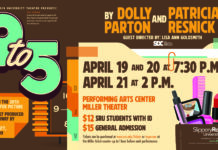As a celebration of International Women’s Day, Slippery Rock University’s UNICEF Club, Women’s Center and Office of Global Engagement hosted activist Sloane Davidson, the mind behind Hello Neighbor. She spoke on Thursday afternoon to students about common misconceptions about and the struggles of refugees and her founder’s journey in a non-profit organization.
Davidson explained that, around the world right now, there are 80 million people displaced from their homes, whether because of war, famine, sexual violence or climate change.
“The amount of people every single day that are displaced from their homes could fill a professional sports stadium,” Davidson said.
Important to note, Davidson added, the majority of these people being displaced are families of middle to low income that don’t leave their country of origin. She compared these situations to those of individuals who moved to different states after their homes were decimated by Hurricane Katrina.
“You’re actually not a refugee,” Davidson said of such cases. “You’ve fled your home, and you might not be able to go back, but you’re a separate term that’s called an internally displaced person.”
However, those who do cross an international border into what is termed a “secondary country” are eligible to apply for refugee status, which is typically a five-year process.
Not all refugees live in camps and there is no such term as an “illegal refugee,” Davidson said, because refugees all come in with papers and receive a social security number.
“There’s actually nobody who has come that we don’t know about,” Davidson said. “That the U.S. government hasn’t approved and hasn’t placed in a city where they know that they’re there.”
Refugees are required to go through health screenings and their education, literacy and accuracy of documentation differ. In most cases, these individuals or families don’t have much of an idea pf where they are relocating to.
“[They] might get a list of five places around the world,” Davidson said. “[They] don’t know them. [They] don’t have Google, [they] don’t have access to a computer. And [they] just pick one.”
Davidson painted a picture of these circumstances from recent experience.
“Some refugees in Pittsburgh legit got off the plane in the middle of February from an African country in flip flops,” Davidson said. “They were like, ‘It snows? It’s cold here?’”
Once arrived, a case worker from a settlement agency helps the refugees get set up, usually in an inexpensive apartment. Kids are enrolled in school and parents are assigned to an English class and applied for jobs. They are given 90 days of initial support from the federal government
With little to no support system or awareness of American culture, refugees are thrown to the wind and expected to be self-sufficient after those 90 days. This resonated with Davidson.
After living away from Pittsburgh for 16 years, Davidson moved back, about six months pregnant with her first son. She couldn’t shake the fact that she was moving back in large part to have the support of her family, meanwhile refugees and immigrants are forced to flee from the same familial backing that would help them raise their children.
Davidson decided to learn the numbers, history and policies regarding refugees. She started having conversations with anyone who knew something, from refugees themselves to interpreters to Social Service agencies. Eventually, she was led to interactions with funders that would spark the idea for Hello Neighbor.
“If you have something that you’re passionate about, that you can’t stop thinking about, have as many conversations as possible with people that know more than you about it,” Davidson advised. “Be as curious as you can possibly be.”
Davidson also volunteered and worked part-time at a settlement agency. She befriended a Syrian family in her own neighborhood that she shared customs and holidays with.
“What I realized was, almost universally for refugees, the social isolation is so severe,” she said, also comparing the situations of senior citizens, single moms and veterans. “It’s destructive.”
This isolation is not for a lack of intellectual curiosity or desire to familiarize themselves with their surroundings.
“If in their country, you walked out the door and got killed, raped or kidnapped, you might get here and just not know what happens if you walked outside the door,” Davidson said.
The vision for Hello Neighbor was that of a “Big Brothers Big Sisters,” but for refugee families. In two-and-a-half years, the organization has matched 122 refugee families from 13 different countries of origin, spending over 5,000 hours of peer-based mentoring.
“It’s not taking time, it’s making time, for the things you care about,” Davidson said.
Davidson believes the program helps bridge the gap between American society and the individuals that are, quite literally, forced into it.
“We have different ideologies and political backgrounds and belief systems,” Davidson said. “And we’re being confronted every single day with this idea that we can’t come to compromise, that polarization is just part of our everyday, that inclusiveness is this weird, ethereal topic that we can’t quite understand. Any little things that any of us can do every single day can actually have a really big impact.”








